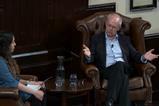The US author Hal Lindsey promoted a dispensationalist view of the end times which continues to hold influence among some evangelicals. But Lindsey’s predictions in his widely read 1970 book The Late Great Planet Earth, haven’t aged well, says Rev Ian Paul

When a student in Oxford in the 1980s, I walked into a church bookshop and picked up a landscape-format book full of complex diagrams. It was setting out the seven dispensations of history, apparently according to the Bible, in which God gave humanity in each era a distinct challenge, which it failed, and a unique means of redemption. Jesus’ atoning death applied only in one of these seven, the ‘church dispensation’, but not to others. I thought this was rather odd, and when I asked the assistant in the shop about it, she replied, “Isn’t that just what the Bible teaches?”
This was one measure of the influence of Hal Lindsey, who died last month aged 95. I don’t think his name is well known in the UK anymore, but through his series of best-selling books in America, and the Left Behind film series based on the novels of Tim LaHaye and Jerry Jenkins (whose son, Dallas, is behind The Chosen film series) which were informed by them, he shaped Christian thinking about the end times for a generation or more.
Many Christians still think that the rapture and the seven-year tribulation are clearly taught in the Bible, that we are in the end times in our era, and that the Book of Revelation is a terrifying prediction of events that are happening in our day.
Lindsey was born in 1929 in Houston, served in the Korean War, and graduated from Dallas Theological Seminary in 1962 with a Masters in Theology. He worked for the evangelistic organisation Campus Crusade for Christ until 1969, and also taught in local churches in California. He continued his study of theology, earning a doctorate in 1994 from the California Graduate School of Theology. It was the combination of study and popular preaching that was key to his influence.
His first and best-known book, The Late, Great Planet Earth (Zondervan, 1970) is a classic example of this - and it is no surprise that the material was turned into both novels and films. It was an exercise in popularising for a new generation the frankly bookish and obscure teaching of John Nelson Darby, founder of the Plymouth Brethren in the 1830s. Darby was a learned but eccentric Anglican cleric in Ireland, who became disillusioned with the Church, coming to believe that ordination was sinful. He published 32 volumes of Bible commentary, and his work contributed to the publication of the Revised Version of the Bible.
Darby’s work had always depended on others for popularisation, and it only became well known in America by its incorporation in the study notes in the Scofield Bible of 1909. Lindsey continued this popularisation for a new generation in a new context, but he depended on several key elements for his work to succeed.
The first was the general sense of crisis in the Cold War era. At one level, his work was classically US-focused, fitting well with the political right in America at the time. It was anti-Communist and pro-Israel, at a time shortly after the Six-Day War of 1967 which alarmed many in Europe and the States. Paradoxically, Lindsey noted the absence of reference to the US in the biblical literature (which is hardly surprising) interpreting this as a prediction that the US would be eclipsed as a world power, either because of subjection to Europe or because of a Communist take-over.
The second key element of his approach to the Bible was to simply ignore its own historical context and reality. Despite, for example, the Book of Revelation being primarily a (prophetic, apocalyptic) letter, which carefully names its actual recipients, and (as scholarship at the same time as Lindsey was writing was clearly demonstrating) expressed in terms that referenced the first-century realities of life, Lindsey took it as a text which was entirely irrelevant to anyone except us, the “last generation”.
he claimed that Jesus would return within 40 years of the foundation of the State of Israel in 1948
Thirdly, because of the need to relate the texts of the New Testament to our day and ignore their relevance to their own time, Lindsey described the Bible as a jigsaw puzzle. The texts as we have them, in their place in the New Testament, don’t actually make sense. The task for the interpreter is to empty the box, sort out the puzzle pieces, and put them back together in a different order which will make sense to the modern reader and speak to him or her about their own world. In response to criticism of this method, Lindsey’s defence was simply “Look at what a great picture you end up with!”
This final observation then became the undoing of his credibility, and why many of his views have been eclipsed. Based on his reading of Matthew 24:34, he claimed that Jesus would return within one generation (40 years) of the foundation of the State of Israel in 1948. (In case you haven’t noticed, he didn’t!). He claimed that the Soviet Union was Gog in Ezekiel 38–39 who would attack the State of Israel, a prediction undone by its collapse in 1991. He predicted that the EU would become a ten-nation confederation to match the ten horns of the beast in Revelation 13. And he believed that the secret Rapture of Christians would happen within his lifetime.
The paradox of Lindsey is that, while he claimed that the Bible could be matched with contemporary political events, his own teaching matched neither. He had to be highly selective, to cut and paste both politics and the Bible, to make the two match. And while denouncing the moral degeneracy of his nation, he himself was divorced and remarried four times.







































No comments yet